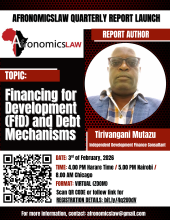Afronomicslaw Sovereign Debt Quarterly Brief No. 9, 2026: Financing for Development (FfD) and Debt Mechanisms: Why Seville Failed the Global South
The report critically reviews the failure of major debt restructuring initiatives between 2015 and 2025 to demonstrate the severity and persistence of the debt crisis and to situate Seville as a missed opportunity for reform. It then analyses what the Outcome Document does and does not achieve on sovereign debt and financial architecture, concluding with recommendations for post-Seville reform. Drawing on dependency theory and a political economy framework, the paper shows how existing power asymmetries, institutional incentives, and global financial structures continue to constrain effective debt solutions for the Global South.
